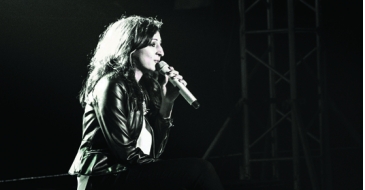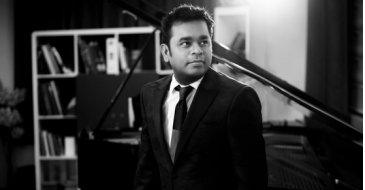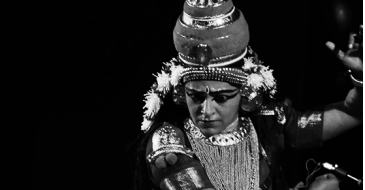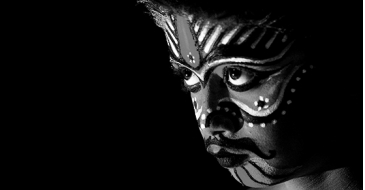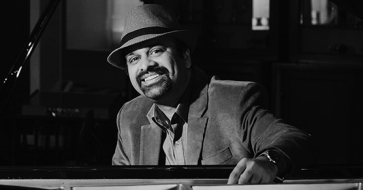Lord Yehudi Menuhin said, "We do need more martial arts training... Wherever it is taught, it eliminates violence. That is so overlooked." What is your take on that?
Absolutely! A martial art form, especially like Thang Ta can never be harmful to society. Its primary foundation is spiritual, and its core purpose is the perfect development of the mind, body and character of an individual. Of course, Thang Ta was practiced a lot in battles and warfare during the times of our forefathers, but the fighting was done with acute awareness. In modern day society, we don’t fight world battles as such, but there is unrest in the world that we live in, and through a solid practice of Thang Ta, more balance and harmony can be created in the younger generation. I believe that training in Thang Ta is a kind of social service; an opportunity and a way to develop ourselves and in turn the society, at large.
Speaking about the performance aspect of Thang Ta, your father, Late Padma Shri Gurumayum Gourakishor Sharma was a pioneer in transforming this martial art form into a performing art form. How and why did he think of transforming something that is so inherently fierce into an aesthetic form?
My father was a venerable teacher and performer. Like I said before, in our modern society, we don’t really fight formal battles or engage in war. Even weapons these days are computerised, so swords and spears are ancient and unnecessary. Our forefathers, ancestors, respected practitioners including my father, have nurtured and safeguarded this legacy for us, with the hope that we will, in turn, preserve it and keep it alive. In the given context, how do we preserve this cultural inheritance? The only way to do that is by transforming it into performance art. That is really why my father initiated the process of developing Thang Ta into a performance art form, and I would say that Thang Ta is still in the process of developing into a full-fledged performance art form. I have been deeply inspired by my father’s efforts; he literally sacrificed his life in keeping this art form alive and in diligently transforming it into a fascinating performance art form that can be presented on prestigious platforms across the globe. I feel personally responsible to sustain his efforts.
To a lay man, swords and spears are instruments of hatred and enmity. What is the message that you are communicating to audiences in a performance through these instruments?
Firstly, the literal translation of Thang Ta in Manipuri is Thang means sword and Ta means spear, so without these instruments a Thang Ta performance is really not possible. Besides, we view these instruments from a very different perspective. In those days, these instruments were used to protect our motherland, and now, we use it to integrate ourselves, develop our character and sustain our cultural legacy. You know, in a performance, the sound produced by the striking of the swords is the primary music for the performance and is very attractive to the audience. The scriptures say that Thang Ta was performed by the Gods and Goddesses at the time of creation of the universe. That maybe a myth, but the point is that its foundation is spiritual.
In Thang Ta performances, these are the kind of messages that we try to communicate. Many performances are based on stories from history, so people can learn about the historic events of our country. Sometimes we focus on abstract ideas... For instance, we showcase two performers of equal calibre who fight each other on stage, and in the end since both of them are equally skilled nobody wins and nobody loses. So they then bow to the audience for allowing them an opportunity to showcase their talent, and then to each other, as a gesture to say, “We both are equal in value, so what is the need to fight?” So the message we are trying to communicate here is that wherever there is violence, nobody really wins in that sense, and every life has equal value, so what is the point of fighting! We usually end our performances on a note like this. This was my father’s style, and we are continuing that tradition.
Warfare and battles have been a part and parcel of Manipur since time immemorial. We still have so many Manipur-Myanmar conflicts, and we, the citizens of the state are in a way used to fighting for self-defence and protection of our motherland; it is really a part of us
Who is Thang Ta meant for? How does a student qualify to train in it?
Thang Ta is meant for anybody who is interested in it. That is really the only criterion. The student must seek the permission of his parents to pursue this art form, he/she must be disciplined in nature, of moral character and physically fit. Now, there are many aspects of Thang Ta. There is Thang Ta for warfare, Thang Ta for performance, and a ritualistic way of practicing Thang Ta.
First, the student must bow to the teacher; this is a formal initiation. After that the Guru will decide what aspect of Thang Ta the student is capable of learning. Following that, a formal ceremony is conducted where the student and teacher offer coconuts, bananas, candles, and flowers to God, and the Guru prays for the welfare of the student. Then the student offers a gift of reverence to the teacher. Now, the student is ready to learn Thang Ta.

Firstly, the literal translation of Thang Ta in Manipuri is Thang means sword and Ta means spear, so without these instruments a Thang Ta performance is really not possible. Besides, we view these instruments from a very different perspective. In those days, these instruments were used to protect our motherland, and now, we use it to integrate ourselves, develop our character and sustain our cultural legacy
Is the training process very rigorous and hard?
If you love something, it won’t be so hard. Although the form appears very difficult, and a lot of practitioners say it is so, I don’t find it all that difficult. Every individual views this differently. If one works hard, one can cross any difficulty that comes in one’s way. Besides, warfare and battles have been a part and parcel of Manipur since time immemorial. We still have so many Manipur-Myanmar conflicts, and we, the citizens of the state are in a way used to fighting for self-defence and protection of our motherland; it is really a part of us.
Besides, the practice of Thang Ta is very profound. It instills thorough discipline in a student. A practitioner of Thang Ta has many restrictions in his/her life, like the kind of things he/she is allowed to do, watch, or eat. It helps integrate one’s body and mind. It helps us develop our inner strength and character. It certainly keeps the body healthy, and only a healthy body can lead to a healthy mind, and then to a healthy society. The art form maybe difficult, but we have the golden opportunity to practice it and change ourselves and the world through it.
Thang Ta remains as one of the two martial art forms of the country that has sustained over the years, but it is still very little known outside of Manipur. Do you think the world needs to know about it?
Yes, absolutely. This is a very significant issue that needs to be addressed. Practices like Thang Ta and Kalaripayattu that are really the country’s cultural property need to be preserved and promoted with utmost care. A lot of Western martial art practices, like Kung Fu, for instance, have crawled into the width and depth of our country and more people seem to be aware of them rather than our own martial art forms.
I firmly believe that one of the ways of preserving this form is by developing the martial art form into a performance art form and popularising it that way, so that it reaches more people. I also really feel that the written word is very important for the preservation of Thang Ta. Our forefathers have not left too much academic content for us to refer to. I think it is important we create an academic repertoire for Thang Ta that the next generation can refer to. If we work in these two directions - popularising it as an art form to attract more people to it, and documentation of the form that will enable the sustenance of the form - we can make a big difference. It was my father who initiated both of these processes by institutionalising the art form in 1958 through his institution Huyen Lallong Manipur Thang Ta Cultural Association, and I hope to sustain his efforts.
Gurumayum Biseshwor Sharma was awarded the Ustad Bismillah Khan Yuva Puraskar by Sangeet Natak Akademi in May 2017
Interviewed by Payal H Chhabria
0 comments Comments






